Almost exactly four months after it was first announced, the City of Burnaby is now ready to formally create its municipal housing corporation, the Burnaby Housing Authority (BHA), with draft articles of incorporation and a business plan set to be approved by Burnaby City Council on Monday evening.
The Burnaby Housing Authority will have four major functions: the acquisition, development, operation, and administration of non-market housing, with the possibility of market rental housing if the revenue generated would contribute towards its non-market housing goals.
The authority will essentially operate like any other private developer, except with a mandate and some assistance provided by the City. Aside from initial seed funding, other kinds of assistance the City could provide include expedited permits, City-guided approval processes, providing City-owned sites for less than market value, and pre-zoning City-owned sites.
The BHA will be an "arms-length" corporation with the City as the corporation's sole shareholder, and the hope is that the BHA will help fill the gaps in Burnaby's housing supply. It may also eventually take over administration of all other non-market housing units that are currently overseen by the City, creating a "one-stop shop" for non-market housing administration and inquiries in Burnaby.
Internal Operations
The Burnaby Housing Authority will be overseen by an autonomous board of directors.
Originally, the board was envisioned to consist of a majority of Council/City staff directors and a minority of external directors. However, after various rounds of engagement with industry stakeholders and the general public, the weights have now been flipped. The BHA board will now consist of 10 directors, with three members of Council, one senior City staff member, four external individuals with expertise in non-profit housing, one individual with expertise in the financial sector, and one individual with expertise in the legal sector.
The day-to-day operations of the BHA will be managed by the CEO, COO, and Director of Development.
"To minimize any perceived or potential conflicts of interest in the making of appointments of BHA Bbard directors and to maximize transparency, the City has engaged a third-party recruitment firm to identify qualified candidates for the inaugural BHA board," the City said in a report to Council. "The recruitment firm has also been asked to note whether any qualified individuals are actively involved in housing developments in Burnaby in order to further minimize the potential for perceived or real conflicts of interest."
The City says that in order to ensure the entire board does not turnover at the same time, terms will be staggered. The 10 board members will be split into one group of five external directors serving a two-year term, while the remaining group of five members will be serving a three-year term. Subsequent re-appointments or new appointments will then be for three-year terms. Directors will also be limited to no more than two consecutive terms or a maximum of six consecutive years, in order to ensure a diversity of perspectives.
Under the BHA's articles of incorporation, there is no mandate to form internal committees, but an Executive Committee can potentially be created.
Of the 10 directors, the six external members will each be compensated $275 per board meeting, committee meeting, special meeting, or workshop that runs for four hours or less. The compensation increases to $550 for meetings that run over four hours. Each member will also be compensated $150 for formal training sessions or meetings with external parties (no time limit), $100 for attending conferences, and $50 for other meetings and activities.
According to the BHA's business plan, project-specific consultation services will be procured as required.
Funding
The Burnaby Housing Authority will be subject to a partnering agreement with the City that runs for an initial term of five years.
The partnering agreement "enables the City to require the BHA to use the funding to deliver services mandated by the City" and also allows the City to potentially "impose terms and conditions on the provision of assistance through further legal agreements, such as loan agreements, contribution agreements and land disposition agreements."
The City says the goal is for the BHA to be operationally self-sustaining, and will thus be tasked with being financially prudent in order to limit the need for ongoing funding from the City after the initial start-up.
The City is projecting a cost of $10.5M for the first five years, consisting of a $475,000 one-time start-up cost plus an annual operating cost of $2M for the first five years, which will be distributed annually rather than as a lump sum.

This does not include the capital costs related to the development of housing, however.
"The partnering agreement will set out the terms and conditions upon which the City may provide financing from the Community Benefit Bonus Affordable Housing Reserve (CBBAHR) of up to a maximum of $100M to the BHA for the development of new affordable housing, along with the related service deliverables and performance standards," says the City. "The partnering agreement may also require the City and the BHA to enter into further legal agreements outlining the terms and conditions pursuant to which this financing will be provided."
Outside of the City, the BHA will also be able to seek out lenders like any other developer and have "significant latitude" to do so, with some protections for the City.
"Recognizing the significant financial cost of non-market housing development, borrowing will be an essential tool for the BHA to meet community housing needs and will allow the BHA to use the assistance provided by the City to leverage third party lenders, including other orders of government, to facilitate the development of non-market housing," says the City. "To mitigate risk to the City, however, the draft articles [of incorporation] require the BHA to obtain Council approval to borrow on the security of the City (e.g. use City assets as collateral) or have the City guarantee any borrowing."
Launch
Following Council approval to officially create the Burnaby Housing Authority, approval will then be required by the Province's Inspector of Municipalities. The aforementioned partnering agreement will then be finalized by November, when the board of directors will also be established, and the BHA will officially launch.
The board will then begin its search for the CEO, who will then fill out the staff and create a 90-day plan and then a first-year strategic plan that will include measurable performance targets. The BHA will also seek out office space for its operations, which will be separate from the City of Burnaby offices in order to reinforce the independence and autonomy of the BHA.
The hope is that the BHA will be able to begin its housing development work by Q4 2024.
- Burnaby Just Made its Province-Leading Renter Protections Even Stronger ›
- Burnaby To Allow Third-Party Building Permit Reviews To Speed Up Approvals ›
- How Housing Trends In Burnaby Have Changed Since 1996 ›
- Burnaby Receives $45M From Federal Housing Accelerator Fund ›
- City Of Burnaby Introduces Proposed Rates For New ACCs ›
- Burnaby Housing Authority Names John Brendan McEown CEO ›






















